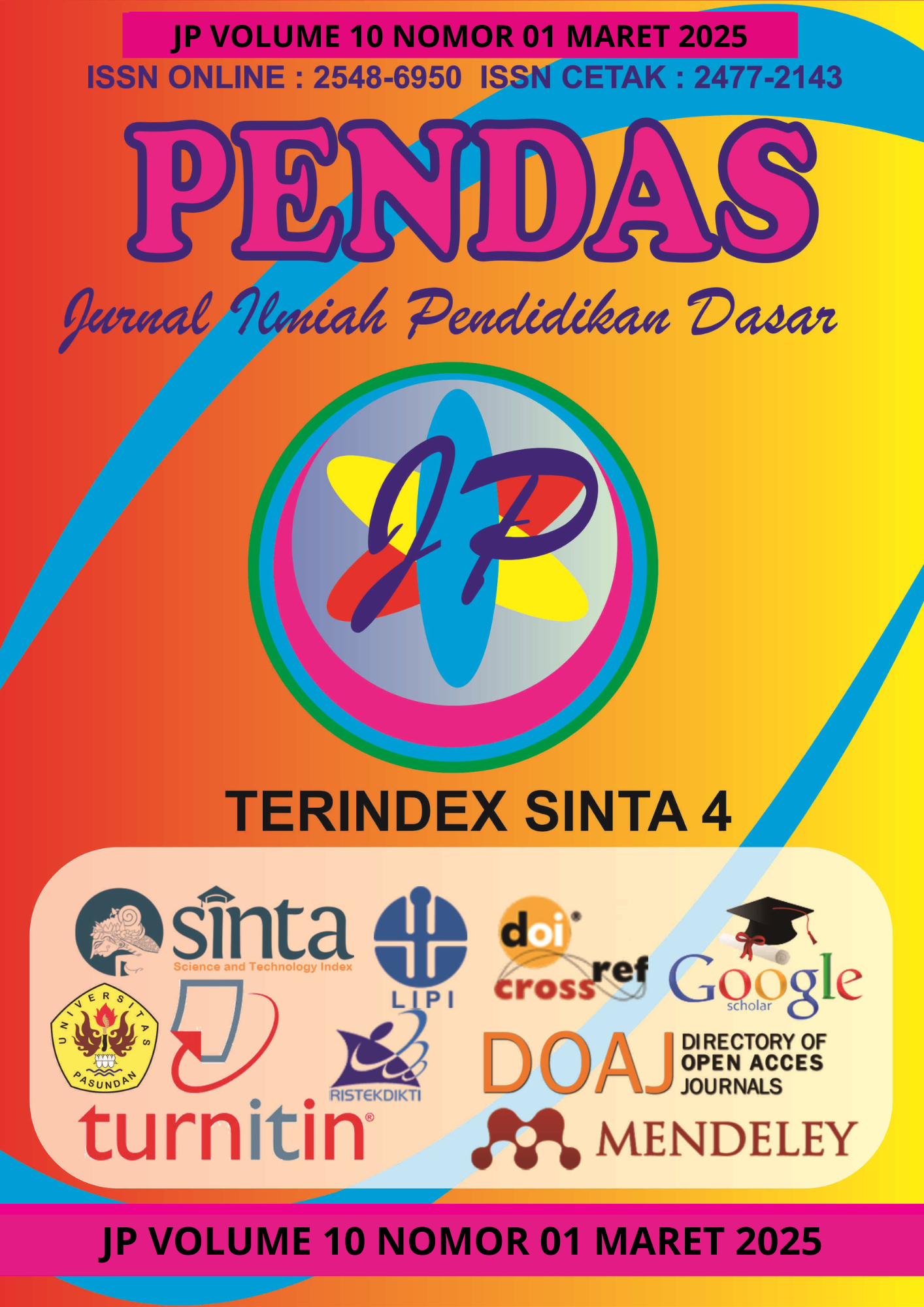PENGARUH PENGGUNAAN MEDIA KONTEKSTUAL DENGAN MODEL PEMBELAJARAN PBL TERHADAP KEMAMPUAN BERFIKIR REFLEKTIF DI KELAS II SND SEDATI GEDE II SIDOARJO
DOI:
https://doi.org/10.23969/jp.v10i01.23511Keywords:
media, contextual, mathematics learning outcomes, reflective thinkingAbstract
This research was motivated by low student learning outcomes in time measurement material and students' level of understanding had not yet reached the level of reflective thinking. This research aims to describe the influence of using contextual media with the PBL model on reflective thinking skills in class II at SDN Sedati Gede 2 Sidoarjo. Contextual media is concrete media that contains cuts, stick-ons and folds, an image that is displayed in front of it and attached to a whiteboard. This type of research uses descriptive quantitative with the "Explanatory sequential design" method. This design involves measuring students' reflective thinking abilities before (pre-test) and after (post-test) treatment in the form of using contextual media to measure mathematics time. This research is included in the Posttest – Preetest type of test which uses 2 classes. The data obtained in this research has an average score of 75.95 from Class 2 - A with 30 students, and from Class 2 - B with 32 students. So it can be said that the use of contextual media that has been developed is also effective on student learning outcomes. So it can be concluded that there is an influence of the use of contextual media on students using the PBL learning model on reflective thinking skills in class II at SDN Sedati Gede 2 Sidoarjo. The results of the research showed that there was a significant increase in students' reflective thinking abilities, thus contextual media was proven to make a positive contribution to the reflective thinking abilities of class II students at SDN Sedati Gede 2 Sidoarjo.
Downloads
References
Rosmiati, R., Liliasari, L., Tjasyono, B., Ramalis, T. R., & Satriawan, M. (2020a). Analysis of Pre-Service Teachers’ Reflective Thinking Ability Profile on Earth Physics Lectures.
Damianti, D., & Afriansyah, E. A. (2022). Analisis Kemampuan Pemecahan
Masalah Matematis Dan Self-Efficacy Siswa. Jurnal Inovasi Pendidikan Dan Pembelajaran Matematika, 8(1), 21–30.
Rosmiati, R., Liliasari, L., Tjasyono, B., Ramalis, T. R., & Satriawan, M. (2020b). Measuring level of reflective thinking of physics pre-service teachers using effective essay argumentation. Reflective Practice, 00(00), 565–586.
Dewi, F. K. M., Mutaqin, A., & Rahayu, I. (2023). Pengembangan E-Modul Dengan Pendekatan Problem Solving Pada Pokok Bahasan Bangun Ruang Sisi Datar. Media Pendidikan Matematika, 11(1), 31. https://doi.org/10.33394/mpm.v11i1.8219
Fitriani, N., Hidayah, I. S., & Nurfauziah, P. (2021). Live Worksheet Realistic Mathematics Education Berbantuan Geogebra: Meningkatkan Abstraksi Matematis Siswa SMP pada Materi Segiempat. JNPM (Jurnal Nasional Pendidikan Matematika), 5(1), 37. https://doi.org/10.33603/jnpm.v5i1.4526
Ha Le, V. H., & Prabjandee, D. (2023). A Review of the Website Liveworksheets.com. Call-Ej, 24(1), 269–279.
Hanria, R., & Fauzan, A. (2023). Pengembangan E-Modul Berbasis Problem Based Learning untuk Meningkatkan Kemampuan Berpikir Reflektif Siswa Kelas VII. Jurnal Basicedu, 7(1), 863–871. https://doi.org/10.31004/basicedu.v7i1.4764
Khikmiyah, F. (2021). Implementasi Web Live Worksheet Berbasis Problem Based Learning Dalam Pembelajaran Matematika. Pedagogy: Jurnal Pendidikan Matematika, 6(1), 1–12. https://doi.org/10.30605/pedagogy.v6i1.1193
Downloads
Published
Issue
Section
License
Copyright (c) 2025 Pendas : Jurnal Ilmiah Pendidikan Dasar

This work is licensed under a Creative Commons Attribution 4.0 International License.














































